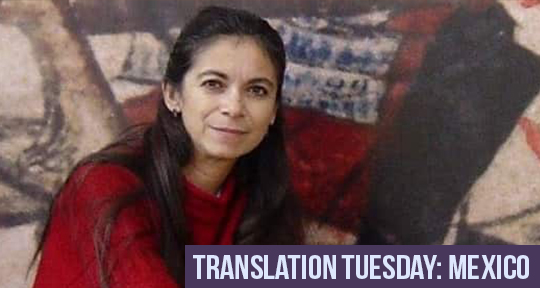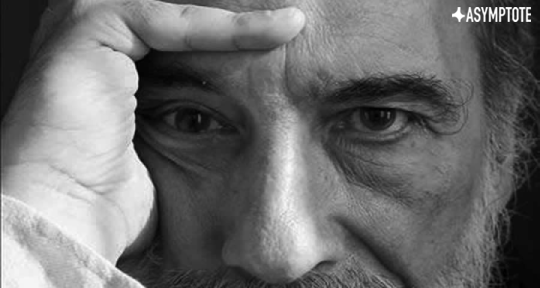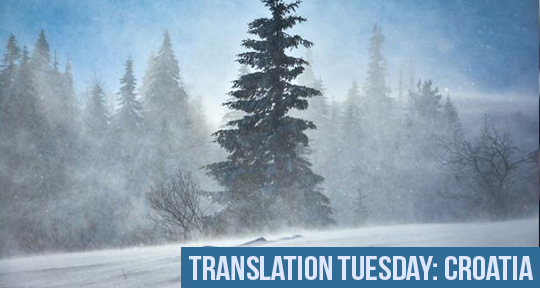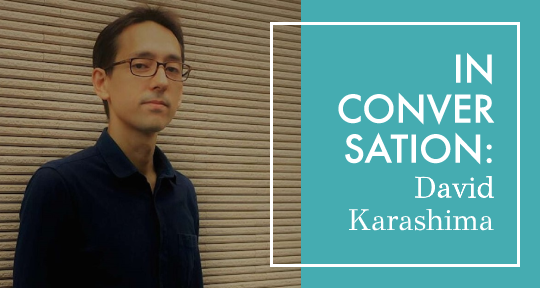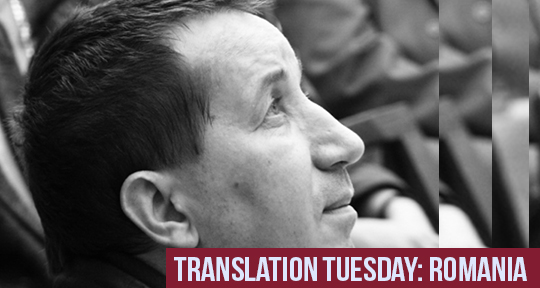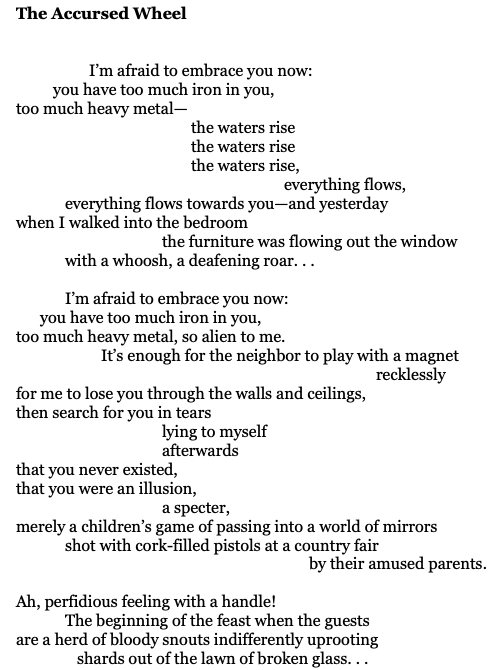A brother’s mission to bring his estranged sister to Zagreb betrays less-than-altruistic motives in Olja Savičević Ivančević’s short story “The Border,” our selection for this week’s Translation Tuesday. Set in the cultural aftermath of the Yugoslav Wars, the enduring religious and ethnic tensions between Bosnia (majority Muslim) and Croatia (majority Catholic) foreground the social taboos that persist at the borders of ethnicity, religion, and sexuality. Our narrator is an exasperated sibling charged with taking care of his (seemingly) eccentric and persistently angry half-sister, Ribbit. Through a sequence of flashbacks and narrative breaks, Ribbit’s true goals are unveiled, bringing to light the source of her defiant anger and her siblings’ xenophobic and homophobic motives. Savičević’s strategically unfolding plot and her skillful use of a morally unreliable (i.e., a clueless and bigoted) narrator provides a fascinating character study of a young woman who must transgress national, societal, and even familial boundaries to freely live her own life.
The cold is unbearable, yet Ribbit, head freshly shaved, wears a miniskirt.
“Isn’t your head cold?”
We stand on a patch of ice in front of her building. It’s Christmas morning. The steam fogs up my glasses. She smokes and shivers in her short jacket.
“I’m asking if you’re cold. Don’t you have a hat?”
“Are ya fuckin’ cold, baldie?! What kind of a bullshit question is that?”
She’s like that. It’s how she talks. A normal person would slap her, but I don’t. She knows I won’t harm her. She flings the cigarette and lights another, ignoring me. Buraz pulls up in my car and steps out. He blows into his hands to warm up and tosses a purse into the trunk.
“Jesus, Ribbit! Don’t be such a dumbass!” He yanks the hood over her head and turns towards me.
“Have her sit in the back and don’t let her out before you get to Zagreb under no circumstances. She’ll cut and run. How do I know where she’d go . . . Yesterday I left her alone for ten minutes. She put on an act like she needed to pee and ended up shaving her head. She can piss in a bag for all I care.”
Buraz pulls forward the seat and she crawls in, onto the back seat.
Ribbit graduated last summer, and is now nineteen. She’s grown tall, five foot eleven. Black eyeliner frames her green eyes. Before her brother slams the door, she screams from the top of her lungs:
“Hey, Buraz! Drop dead, ya filthy scumbag!”
She’s crazier than she used to be, but then again, she was never terribly normal.
I press the gas pedal. The car rattles, then slides down the slope’s muddy ruts, across frozen puddles. I exhale when I see Buraz disappear toward the building. In the rearview mirror I catch Ribbit’s empty side profile. She’s stuffing her thumb, with its blue fingernail, into her mouth.
The streets are empty as the snow-water pisses down. Random windows sparkle with Christmas ornaments and crosses made of string lights. A plastic Santa with a busted nose climbs over one balcony.
“There’s some ice on the road, but fortunately it’s not a long trip,” I tell her in the rearview mirror.
I had received the call from Buraz two days earlier. He had begged me desperately to take our sister in at my place in Zagreb. A few months, a year, who knows? Maybe even for good I thought, and did not like it one bit.
“Buraz pleaded for me to take you,” I try to suck up to her a little. “He’s terribly worried about you, you know. Look, he couldn’t even wait until after Christmas. I know you’re upset right now, but you’ll like it in Zagreb. Don’t worry. You’ll work in my shop. I can use the help.”
“I heard you went bust!”
I’m not close to Buraz, or Ribbit. The last time I saw them was two years ago in Bosnia at the funeral of a man who had been our father, my sorta-father, just like they’re my half-sister and half-brother.
I remember when I first met Ribbit. She was five and wore a flannel nightgown around the flat. She had the flu, yet still she kept chirping, wouldn’t keep quiet. Now she’s mum the entire trip, impenetrable.
New bright snow starts sprinkling and as soon as we leave the city the world outside the car windows becomes dreamlike, like a piece of naïve art, but beautiful. The small houses in snow-blanketed valleys are all equally white, even the ones without doors and windows. Smoke from the chimneys disappears into the hills. The roads are lined with newly built minarets, or tall church towers under construction, depending which town we’re passing through.
“Check it out, Bosnia with whipped cream,” I say to break the silence.
“Right. Shit topped with cream still tastes like shit.”
I surf the radio stations.
“If you say so.”
Her problem, not mine. I’ve got nothing to do with Bosnia except for my father and except for the two of them. And we aren’t even alike. The folk singer cursing love on the radio sounds better than Ribbit piercing my ears with silence. She glues her forehead and nose to the window. A young lady, yet still a child. A big bald baby. While on a straight stretch of road, I look over my glasses at my hairline in the mirror. She’s right, goddammit, I’m rapidly losing my hair.
“Want to sit up front? It’s more comfortable.”
Curled up in that tiny skirt, she shakes her head and then drops it between her embraced raised knees. On her scalp is a fresh scar and redness, probably from shaving. What the hell did she do that for? I remember she used to have long, golden hair when she was a child, nearly platinum. Later she had red hair, then it was black with a piercing in her brow. Then it was green with another piercing in her belly button, and the last time I saw her, canary-yellow.
“Well,” I give it another go. “It won’t be so bad. You always liked Zagreb. It will be nice, it’s a big city. Theatre, live music, nightlife. You’ll see, dear. So much better for a young girl than in a small . . .”
She lifts her head and looks at me with hatred, then lays it onto her knees again, without a word. She remains that way the entire trip, motionless—all the while the news keeps forecasting a snowstorm and negative twenty degrees that night. Only after we pass through the villages near the border does she stir. At that point she gets antsy. I tawt I taw a puddy tat, I think to myself and keep slowly driving toward the border.
“Hey, can we stop? I gotta pee. Oh, come on! Don’t be a dick, brother. I’m not gonna run away. Where the hell would I go, anyway?”
We’re surrounded by a desert of snow. An erased space. A few empty houses gape hollow by the side of the road and in the distance are woods. A kilometer down the road we see a large house with a neon Tavern sign. Only the bottom part of the lemon-yellow facade is finished. I park near the front—looks like it’s open. Ribbit gets out of the car and spreads her arms over her head as if she’s surrendering or waving and for a moment it seems as if a slight smile cracks across her face, the first one I’ve seen since I arrived.
In front of the tavern stands a scrawny Christmas tree, and inside, right above the bar, hang photographs of war generals decorated with shiny holiday tinsel.
While I wait for Ribbit, I order us coffee and settle closer to the fireplace. I hope she doesn’t vanish through the bathroom window, like in the movies.
Buraz said this: “Yeah, she’s a shame to me and the family but dammit, I worry about her. Someone’s gonna beat her to death while she’s walking home at night.” I imagine Ribbit tramping down dark city streets late at night with that once colorful, and now bald, female head beneath thin Christmas paper lanterns swinging in the wind.
It’s always windy around there.
“So, what’d Buraz tell ya?” she asks, returning from the bathroom.
He had shoved an envelope into my hands. “Here’re her documents. You better hide ’em in a safe spot once you get to Zagreb. It’s her ID, passport, health card, driver’s license, etc. There’s enough money for bills and food for at least three or four months.”
The envelope contained a whole lot more than food money. Buraz knows the shop has not been doing well, and that I’m up to my neck in debt. And I know it, too. He winked and gave me a tap, rubbed my shoulder for a second, like brothers do, a buddy to buddy. “You gotta keep her papers under lock and key. Swear on your life.”
“He told me everything, and just to be clear,” I respond to Ribbit, “in this case I’m entirely on his side. You can’t chase a married man.”
I lean over the table toward her. “A married man, and on top of that, one of theirs? You’ve really crossed the line. You’re truly asking for someone to break your bones and toss you into a trash can.”
Ribbit looks at me without blinking those green eyes, now smeared with makeup.
“Whaddaya mean, one of theirs?!”
“You know what I mean. Personally I have nothing for or against them, but I’m concerned about your wellbeing. You’ve crossed the line. That’s no small thing, Ribbit, not in Zagreb or Frankfurt or London or anywhere else in the world, never mind in the small . . .”
“What ya talking about, dude. One of their guys?!”
Ribbit laughs, but in a slow, heavy manner, as if she’s shorting, skipping. She tosses the small plastic coffee spoon toward me onto the tablecloth. “You mean their girls. It’s a she.”
“A she,” I repeat as if in a dream.
“Yep, a she. Her name’s Senada. What ya starin’ at,” Ribbit says rocking in her chair.
Senada is the woman Ribbit babysat for at times, that much I know. I only saw her once, at a funeral. A pale girl with dark eyes, two or three years older than Ribbit.
“And I ain’t chasin’ her. Her idiot husband’s been killin’ her since they got married. He’s after her. I ain’t chasin’ no one. We’re an item. Now ya know the whole truth.”
I feel the room spin and the coffee mixed with acid from my stomach returns into my throat. I inhale sharply, so much that it hurts.
“Since when are you into women? You used to have boyfriends.”
“I’m not into women. I’m into Senada. She’s my woman, gettit? We were gonna go with her kid to her sister’s in Sarajevo. She found a job there. But her husband figured everything out and collared Buraz. He stole her documents just like Buraz stole mine so Senada and I couldn’t cross the border to see each other. Buraz lied. He lies the moment he opens his mouth. Obviously the truth is worse than what ya thought,” she says and fires off another burst of laughter.
“Give me a break!” I yell. “Did Buraz shave your head?”
She blushes.
“Ah, well, good for him,” I say dryly and release the air from my lungs. I take the car keys and leave enough cash on the table for coffee.
“Wait for me in the car, it’s open.”
I feel the envelope with her documents and the money in the inside pocket of my coat. At the bar I wrap the envelope several times with tape and put it back in its place.
As soon as I walk down the tavern’s steps, I feel a hefty stone, or perhaps a piece of ice, hit my neck. The blow is cold and sharp. I’m stunned by the ferocity with which she pounces on me, biting my cheek and ear. She wraps her legs around my waist, mounts my back and keeps pounding, biting till she pulls off my glasses and snatches my keys. I barely break free and throw her onto the ground, stuffing her eyes and mouth with snow. That subdues her momentarily. My ear bleeds, and so does my lip. I hopelessly try to find my glasses, buried somewhere in the snow. Under my weight Ribbit cries, howls and wails from the top of her lungs. The few restaurant patrons are now crowding the windows, staring. They see a maniac strangling a bald girl. I hurry up before some fool dares to get involved. I thrust her down with my whole body so she can’t move and with my free hand I pry the envelope out of my pocket: “I see you’ve planned this all out, but you’re missing something.” I say into her ear, lying on top of her. I rub my own blood off her smeared face. “Merry Christmas, little sister,” I say. “And Merry Christmas to Senada.” I shove the envelope into her tights, ass-bound, deeply, so it won’t fall out: “You won’t get far without this.”
She kicks me in the groin and I turn over, folded up. Lying in the snow I see the blurry outline of that scrawny Christmas tree in front of the tavern at the Bosnian-Croatian border. Lights blink red-white-blue-red or perhaps in some other order . . . My glasses rest in the snow, too, surprisingly intact. I wait for her to stagger to the car, and then I put them on, slowly, not to hurt my ear. The forecast called for a deep drop below freezing and a blizzard. Another hour and a half to Zagreb. Ribbit finally starts the car and takes off in the direction opposite the border, toward Senada. By now people have already run out the front of the tavern.
I grab that hefty stone and throw it at the car, aiming precisely, so the rear window cracks audibly, and folks will never say I let her go without a fight.
Translated from the Croatian by Andrea Jurjević
Novelist and poet Olja Savičević Ivančević is one of the most prominent contemporary Croatian writers. Recipient of numerous awards and honors, her books have been translated into eleven languages. English translations of her work include her novels Adios, Cowboy (McSweeney’s) and Singer in the Night (Istros Books), both translated by Celia Hawkesworth, and the poetry collection Mamasafari (Diálogos) translated by Andrea Jurjević.
Andrea Jurjević grew up in Rijeka, Croatia, in the former Yugoslavia, before immigrating to the United States. Her debut poetry collection, Small Crimes, won the 2015 Philip Levine Poetry Prize, and her book-length translations from Croatian include Mamasafari (Diálogos Press, 2018) and Dead Letter Office (The Word Works, 2020).
*****
Read more on the Asymptote blog:

